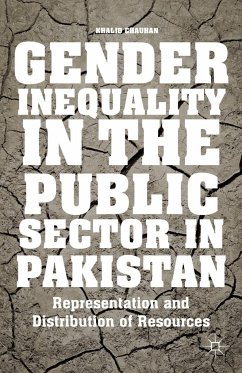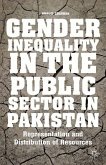As gender training is applied increasingly as a development solution to gender inequality, this book examines gender inequality in Pakistan's public sector and questions whether a singular focus on gender training is enough to achieve progress in a patriarchal institutional context.
"Chauhan's work is a timely contribution to the existing literature on Gender Inequality in Pakistan as it touches the root cause of the problem. His analysis goes beyond the usual NGO mantra of gender sensitization workshops as a panacea to gender inequality. Public policies hold the key to the changes from within, and Chauhan has substantiated that the problem lies with the patriarchal public sector that continues to support the status quo." - Tahmina Rashid, Qatar University
Addressing deeply entrenched discrimination against women has been on the international development agenda for four decades. Despite some progress, shocking levels gender-based inequality remain. In Pakistan, the challenges are particularly acute. Khalid Chauhan confronts us with those challenges and demands that we rethink the ways in which gender inequality is addressed. Gender Inequality in the Public Sector in Pakistan an important book for all those with a commitment to gender equality, social justice and good governance. It deserves to be read.-
Sharon Bessell, Australian National University
"Chauhan presents Pakistan as a crucial case of gender inequality in the public sector. The mere five percent of women in Pakistan's public workforce mirrors enormous gender inequality elsewhere in the society. Chauhan traces the adoption of `gender training' as a principal strategy for dealing with gender inequality, part of the call in development work to `get institutions right.' The book convincingly shows the gross inadequacy of gender training as main means of dealing with forms of gender inequality that are structural and deeply entrenched." - Patrick Kilby, Australian National Univeristy
Addressing deeply entrenched discrimination against women has been on the international development agenda for four decades. Despite some progress, shocking levels gender-based inequality remain. In Pakistan, the challenges are particularly acute. Khalid Chauhan confronts us with those challenges and demands that we rethink the ways in which gender inequality is addressed. Gender Inequality in the Public Sector in Pakistan an important book for all those with a commitment to gender equality, social justice and good governance. It deserves to be read.-
Sharon Bessell, Australian National University
"Chauhan presents Pakistan as a crucial case of gender inequality in the public sector. The mere five percent of women in Pakistan's public workforce mirrors enormous gender inequality elsewhere in the society. Chauhan traces the adoption of `gender training' as a principal strategy for dealing with gender inequality, part of the call in development work to `get institutions right.' The book convincingly shows the gross inadequacy of gender training as main means of dealing with forms of gender inequality that are structural and deeply entrenched." - Patrick Kilby, Australian National Univeristy








